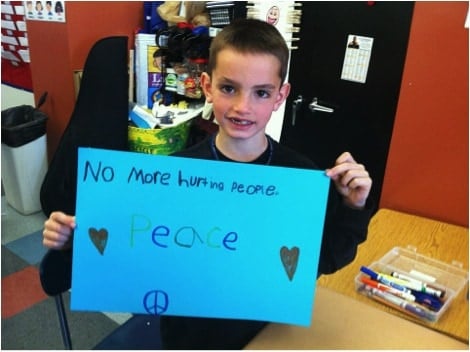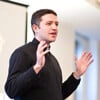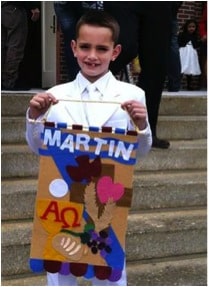
First Communion
There’s a queasy, sinking feeling that settles in the gut as we learn more details about Dzhokhar and Tamerlan Tsarnaev – the brothers who claim responsibility for Monday’s bombing and Thursday’s shootings in Boston. As a nation we’ve been glued to shaky helicopter camera footage showing us a red-streaked Copley Square. We saw photographs of people sprawled out – stunned – on the stained concrete. Their faces betrayed shock at unanswered questions – what had happened? Is that my blood? The articles we’ve read online tell of deafening blasts and missing limbs, of lockdowns, boats, and shootouts in the city streets. Pressure cooker bombs filled with deadly metal and designed to inflict pain. Manhunts and hurled explosives. It’s the kind of news we expect to be reported in a movie, or – let’s be honest – from somewhere far away.
***
Although other news has occupied the last twenty four hours, Tuesday morning offered the back story of little Martin Richard of Dorchester, Massachusetts. He was one of the three who died in the dual bombings. He was killed cheering on his father’s friends who were running. His older sister lost part of her leg, and his mother sustained a serious wound to her head. When his First Communion photograph came up in my Facebook feed I first thought, “What a cute little dude – I wonder who’s nephew or son this is?” And then I read the accompanying subtitle. My heart sank.
Our hearts sink. Our nation’s heart, beating and bleeding, sinks again.
Or thumps with the anxiety of the unknown. As fast as news websites can be updated, we’re learning more puzzling details come out about the Chechen brothers Tsarnaev. We’re learning how totally incapable of such heinous acts they have seemed to their friends. We vacillate between simmering anger and the anxiety of an uncertain future. Why would they do this? God, where will this happen next? Are tragedies the only things that can unite us anymore?
We stare out our windows onto a world in which predictable beauties and taken-for-granted securities seem no longer so. Now, floating on the periphery, is sobering reality of two more hurt – or angry, or ill, or I know not what – souls, paying hurt forward in ways that make the rest of us sick.
Is it that we feel sick because… our confidence in a good God is shaken? No, that’s not quite it. I think it’s more that we’re dismayed because our faith in humankind’s general goodness has been, again, betrayed by tragedy. And we’re unsettled because even though this goes on all the time around the world, it’s getting too close now; it’s changing us now.
***
One of the ways we’re being changed emerges as a social media pattern I’m noticing. At its worst Facebook is a platform for bragging and griping (about NCAA brackets, the weather, work). But in these sobering moments that capture a nation’s attention, the Facebook feed reads like a virtual book of lamentations, a list of condolences and a gathering place where we can offer one another support and comfort. To point out a few:
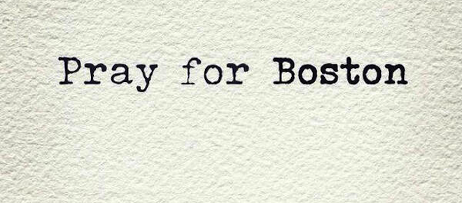
***
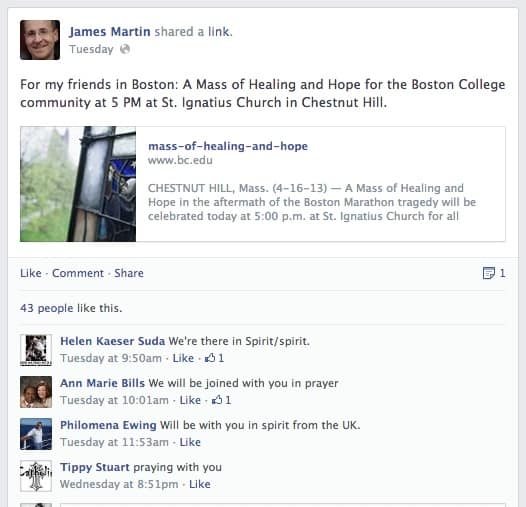
James Martin FB Prayer
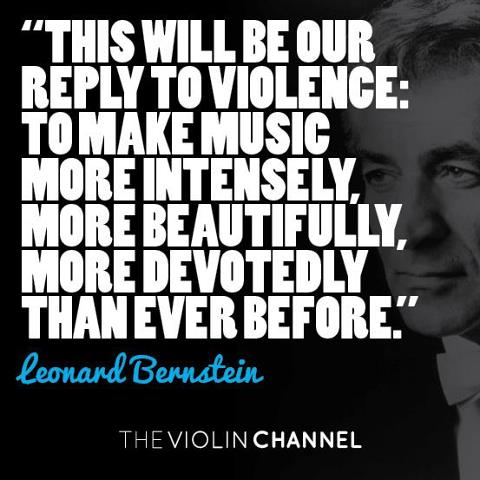
***
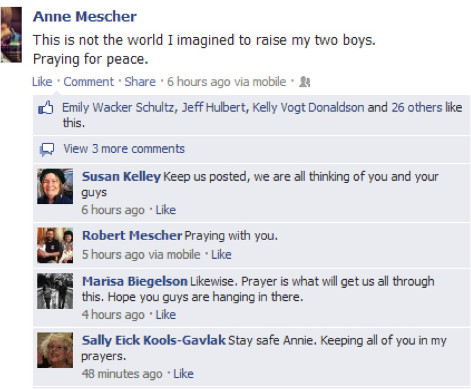
***
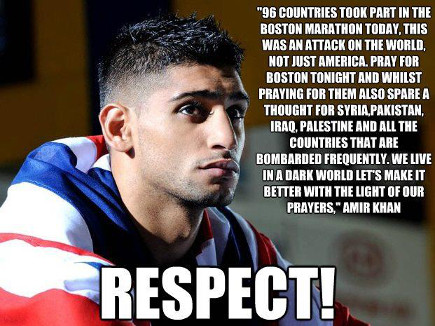
Amir Khan
These posts cry out: We don’t want to dwell in anger and anxiety. Our nation’s heart desires healing, understanding, peace. In the dark hours of incomprehension and anger, light shines forth in the good deeds – and inspired hopes – of ordinary Americans. We’re using Facebook to raise each other’s spirits and not lose hope in the darkness.
Consider the first responders and policemen who ran to the rescue seconds after the blasts. Consider the marathon finishers who ran back to staunch the wounds of those fallen. And consider this inspired use of technology: a Google Doc is floating around Facebook, where hundreds of people are offering their couches or guest rooms for people affected by the bombing.
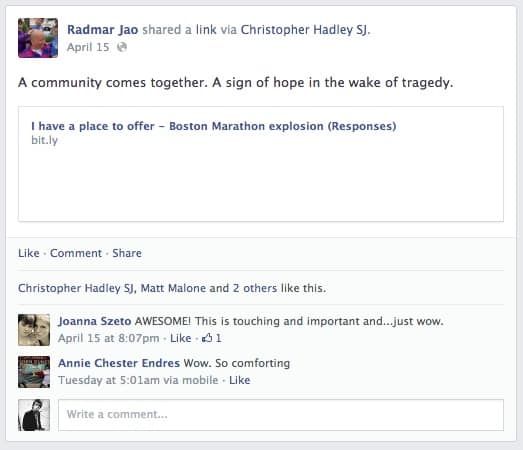
I Have Room
The reality: No amount of information about the Tsarnaev brothers will take away the panic and harm that they have caused this week. And of course no amount of Facebook is enough. But it is a window in our nation’s heart – a place where it’s so evident that we do not want to let hate and anger and anxiety have the last word.
A graduate student in Boston, Lisa Conti, says that now is the time to “make room for love” – and that’s what I see people have been doing on Facebook. “Imagine how much deeper the wound would be if we filled the empty spaces with hate instead of love,” she writes. I could not agree more.

